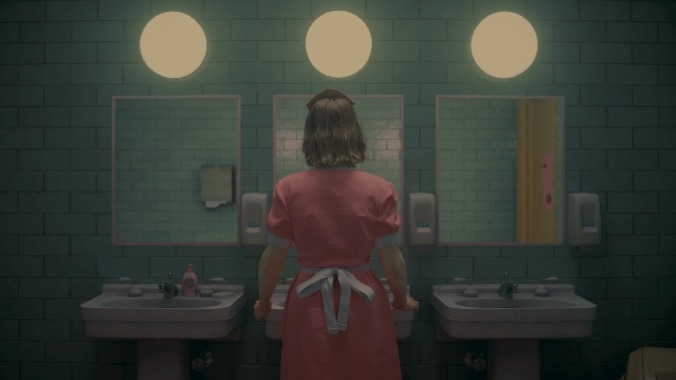Alan Wake II: Night Springs Is An Exciting and Appropriately Meta Follow-Up

I can’t pretend that Alan Wake II is a game I ever wanted DLC for. Remedy Entertainment’s postmodern metanarrative inspired me to dream again at a time when life seemed stagnant, making me feel almost protective of the work. You don’t want to have too much of a great thing, at risk of spoiling it. However, if I learned something from this add-on, it’s that I need to learn to shut up and trust Remedy more—they know what they’re doing.
Sam Lake graced the stage at Summer Game Fest 2024 to announce that the Night Springs DLC would release on June 8th, mere hours after its reveal. The title “Night Springs” will appeal to those deeply immersed in the spiral of Remedy’s connected universe. Alan Wake began his career as a writer for the show, and the Twilight Zone-inspired series has made itself a staple within Remedy’s games, appearing in Quantum Break and Control as easter eggs. Alan Wake’s American Nightmare, a mini-sequel to the original title, sees Wake utilize his familiarity with the series as a means to escape the Dark Place. Night Springs, therefore, serves as a spiritual successor of sorts to American Nightmare, as Wake once again tries to use the show to escape his own nightmares. There are three playable episodes that highlight these attempts: “Number One Fan,” “North Star,” and “Time Breaker,” each expanding upon unique elements that made the base game great.
“Number One Fan” gives us control of The Waitress— ambiguously referred to within this episode, though players will recognize her as Rose Marigold, the obsessive fan who runs the Oh Deer Diner in Bright Falls. This episode delivers a pure power trip as The Waitress blasts through enemies, trusty shotgun at her disposal, dashing to save her beloved from “Haters.” Alan Wake II told a very serious story while still incorporating Remedy’s take on Lynchian humor, and that goofiness is turned up to 11 here. We’re experiencing a twisted writer’s take on the inner psyche of a woman obsessed with him, working with a genre and tropes he has little experience in. Campy rock music plays over every encounter, Rose makes quips as she pushes through encounters and characters behave like they’re pulled from a teenager’s diary. It’s clumsy, and intentionally so, becoming a campy and hilarious time.
The largest fault I take with Remedy’s game design is their set piece moments—larger-than-life punches like the summoning scene in Alan Wake II and the Anderson farm in Alan Wake. It’s clear that you are meant to feel like an unadulterated badass while playing these sequences as you take down swarms of enemies, driven by a sweeping accompanying music track. However, the balance never quite seems tipped in the player’s favor, and while these stretches are conceptually amazing, they sometimes fall flat in frustration. This episode eschews any idea of that. Remedy has dropped the idea of survival horror here: there is an overabundance of ammunition, healing items restore greater amounts of health, and enemies never overwhelm the player. You don’t need to burn away darkness with a flashlight. The focus here isn’t on scares, it’s on thrills. You truly feel like the badass you are meant to be in these moments. Remedy tells us, “Please, go trigger happy.”
This design approach carries through to the following episodes of the game. “North Star” sees the player control The Sibling— once again, someone who looks like Control’s Jesse Faden but for all intents and purposes is not Jesse Faden. The story itself dips into the roots of Control, making mention of government agencies and secret plots, and allows the tone of the game to shift back into its more familiar survival horror footing. Each episode seems to serve as a tonal blow up to the best experiences of the base game, whether you crave the strange blend of humor, darkly intense scares, or surreal environments. The Sibling’s search for her brother through a cult-maintained Coffee World steeps itself in those intense scares, creating an environment that would feel at home in either Control or Alan Wake II.
-

-

-

-

-

-

-

-

-

-

-

-

-

-

-

-

-

-

-

-

-

-

-

-

-

-

-

-

-

-

-

-

-

-

-

-

-

-

-

-








































